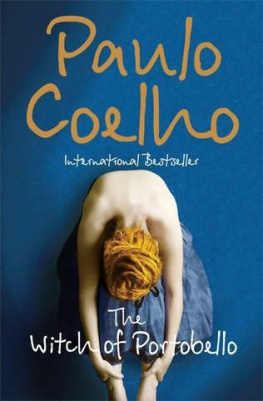Paulo Coelho - The Devil and Miss Prym
Here you can read online Paulo Coelho - The Devil and Miss Prym full text of the book (entire story) in english for free. Download pdf and epub, get meaning, cover and reviews about this ebook. year: 2001, publisher: HarperCollins, genre: Prose. Description of the work, (preface) as well as reviews are available. Best literature library LitArk.com created for fans of good reading and offers a wide selection of genres:
Romance novel
Science fiction
Adventure
Detective
Science
History
Home and family
Prose
Art
Politics
Computer
Non-fiction
Religion
Business
Children
Humor
Choose a favorite category and find really read worthwhile books. Enjoy immersion in the world of imagination, feel the emotions of the characters or learn something new for yourself, make an fascinating discovery.
- Book:The Devil and Miss Prym
- Author:
- Publisher:HarperCollins
- Genre:
- Year:2001
- Rating:4 / 5
- Favourites:Add to favourites
- Your mark:
- 80
- 1
- 2
- 3
- 4
- 5
The Devil and Miss Prym: summary, description and annotation
We offer to read an annotation, description, summary or preface (depends on what the author of the book "The Devil and Miss Prym" wrote himself). If you haven't found the necessary information about the book — write in the comments, we will try to find it.
The Devil and Miss Prym — read online for free the complete book (whole text) full work
Below is the text of the book, divided by pages. System saving the place of the last page read, allows you to conveniently read the book "The Devil and Miss Prym" online for free, without having to search again every time where you left off. Put a bookmark, and you can go to the page where you finished reading at any time.
Font size:
Interval:
Bookmark:
The Devil and Miss Prym Coelho, Paulo
Buenos Aires, August 2000
For almost fifteen years, old Berta had spent every day sitting outside her front door. The people of Viscos knew that this was normal behaviour amongst old people: they sit dreaming of the past and of their youth; they look out at a world in which they no longer play a part and try to find something to talk to the neighbours about.
Berta, however, had a reason for being there. And that morning her waiting came to an end when she saw the stranger climbing the steep hill up to the village, heading for its one hotel. He did not look as she had so often imagined he would: his clothes were shabby, he wore his hair unfashionably long, he was unshaven.
And he was accompanied by the Devil.
'My husband's right,' she said to herself. 'If I hadn't been here, no one would have noticed.'
She was hopeless at telling people's ages and put the man's somewhere between forty and fifty. 'A youngster,' she thought, using a scale of values that only old people under
stand. She wondered how lone he would be stayine. but just stay one night before moving on to a fate about which she knew nothing and cared even less.
Even so, all the years she had spent sitting by her front door waiting for his arrival had not been in vain, because they had taught her the beauty of the mountains, something she had never really noticed before, simply because she had been born in that place and had always tended to take the landscape for granted.
As expected, the stranger went into the hotel. Berta wondered if she should go and warn the priest about this undesirable visitor, but she knew he wouldn't listen to her, dismissing the matter as the kind of thing old people like to worry about.
So now she just had to wait and see what happened. It doesn't take a devil much time to bring about destruction; they are like storms, hurricanes or avalanches, which, in a few short hours, can destroy trees planted two hundred years before. Suddenly, Berta realised that the mere fact that Evil had just arrived in Viscos did not change anything: devils come and go all the time without necessarily affecting anything by their presence. They are constantly abroad in the world, some times simply to find out what's going on, at others to put some soul or other to the test. But they are fickle creatures, and there is no logic in their choice of target, being drawn merely by the pleasure of a battle worth anyone for more than a day, let alone someone as important and busy as a messenger from the dark.
She tried to turn her mind to something else, but she couldn't get the image of the stranger out of her head. The sky, which had been clear and bright up until then, suddenly clouded over.
'That's normal, it always happens at this time of year,' she thought. It was simply a coincidence and had nothing to do with the stranger's arrival.
Then, in the distance, she heard a clap of thunder, followed by another three. On the one hand, this simply meant that rain was on the way; on the other, if the old superstitions of the village were to be believed, the sound could be interpreted as the voice of an angry God, protesting that mankind had grown indifferent to His presence.
'Perhaps I should do something. After all, what I was waiting for has finally happened.'
She sat for a few minutes, paying close attention to everything going on around her; the clouds had continued to gather above the village, but she heard no other sounds. As a good ex-Catholic, she put no store by traditions and superstitions, especially those of Viscos, which had their roots in the ancient Celtic civilisation that once existed in the place.
'A thunderclap is an entirely natural phenomenon. If God wanted to talk to man, he wouldn't use such roundabout methods.'
this time. Berta got to her feet, picked up her chair and went into her house before the rain started; but this time she felt her heart contract with an indefinable fear.
'What should I do?'
Again she wished that the stranger would simply leave at once; she was too old to help herself or her village, far less assist Almighty God, who, if He needed any help, would surely have chosen someone younger. This was all just some insane dream; her husband clearly had nothing better to do than to invent ways of helping her pass the time.
But of one thing she was sure, she had seen the Devil.
In the flesh and dressed as a pilgrim.
The hotel was, at one and the same time, a shop selling local products, a restaurant serving food typical of the region, and a bar where the people of Viscos could gather to talk about what they always talked about: how the weather was doing, or how young people had no interest in the village. 'Nine months of winter, three months of hell,' they used to say, referring to the fact that each year they had only ninety days to carry out all the work in the fields, fertilising, sowing, waiting, then harvesting the crops, storing the hay and shearing the sheep.
Everyone who lived there knew they were clinging to a world whose days were numbered; even so, it was not easy for them to accept that they would be the last generation of the farmers and shepherds who had lived in those mountains for centuries. Sooner or later the machines would arrive, the livestock would be reared far from there on special food, the village itself might well be sold to a big multinational that would turn it into a ski resort.
That is what had happened to other villages in the region, but Viscos had resisted - because it owed a debt to the past, The stranger carefully read the form he was given to fill in at the hotel, deciding what he was going to put. From his accent, they would know he came from some South American country, and he decided it should be Argentina, because he really liked their football team. In the space left for his address, he wrote Colombia Street, knowing that South Americans are in the habit of paying homage to each other by naming important places after neighbouring countries. As his name, he chose that of a famous terrorist from the previous century.
In less than two hours, all the 281 inhabitants of Viscos knew that a stranger named Carlos had arrived in the village, that he had been born in Argentina and now lived in a pleasant street in Buenos Aires. That is the advantage of very small villages: without making the slightest effort, you can learn all there is to know about a person's life.
Which was precisely what the newcomer wanted.
He went up to his room and unpacked his rucksack: it contained a few clothes, a shaving kit, an extra pair of shoes, vitamins to ward off colds, a thick notebook to write in, and eleven bars of gold, each weighing two kilos. Worn out by tension, by the climb and by the weight he had been carrying, the stranger fell asleep almost at once, though not before placing a chair under the door handle, even though he knew he could count on each and every one of Viscos' 281 inhabitants.
The next morning he ate breakfast, left his dirty clothes at reception to be laundered, put the gold bars back in his rucksack, and set off for the mountain to the east of the village. On his way, he saw only one villager, an old woman sitting in front of her house, who was looking at him with great interest.
He plunged into the forest, where he waited until his hearing had become used to the noises made by the insects and birds, and by the wind rattling the leafless branches; he knew that in a place like this someone could easily be observing him without his being aware of it, so he stood there for almost an hour without doing anything.
When he felt sure that any possible observer would have lost interest and moved on without anything to report, he dug a hole close to a rocky outcrop in the shape of a Y and hid one of the bars there. Then he climbed a little higher, spent another hour as if in rapt contemplation of nature, spotted another rocky outcrop - this time in the form of an eagle - and dug another hole, in which he placed the remaining ten gold bars.
Font size:
Interval:
Bookmark:
Similar books «The Devil and Miss Prym»
Look at similar books to The Devil and Miss Prym. We have selected literature similar in name and meaning in the hope of providing readers with more options to find new, interesting, not yet read works.
Discussion, reviews of the book The Devil and Miss Prym and just readers' own opinions. Leave your comments, write what you think about the work, its meaning or the main characters. Specify what exactly you liked and what you didn't like, and why you think so.













